

Downloads. What can I do with an economics degree? A degree in economics provides you with a wide array of both subject-specific and transferable skills, all of which are highly sought after by employers...
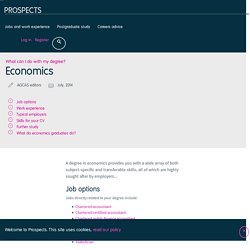
Job options Jobs directly related to your degree include: Jobs where your degree would be useful include: Remember that many employers accept applications from graduates with any degree subject, so don’t restrict your thinking to the jobs listed here. Work experience In order to find out more about work in economics, you could consider applying for a place on the Government Economic Service (GES) summer vacation placement scheme, which offers work experience opportunities for 6-12 weeks. You could also consider work experience or work shadowing in areas such as accountancy and finance. Any work experience is good experience as it allows you to build essential skills in a variety of areas such as teamwork, communication and time management. What jobs can you do with a degree in economics and politics? Live chat.
Careers with a degree in Economics. What skills have I gained on my course?
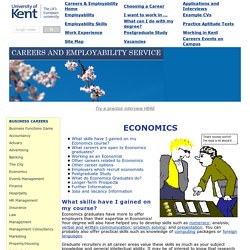
Economics graduates have more to offer employers than their expertise in Economics! Your degree will also have helped you to develop skills such as numeracy; analysis; verbal and written communication; problem solving; and presentation. You can probably also offer practical skills such as knowledge of computing packages or foreign languages. Graduate recruiters in all career areas value these skills as much as your subject knowledge and general intellectual ability.
It may be of interest to know that research at Kent University shows that Economics graduates enjoy the highest earnings premia among all graduates! For a comprehensive skills and employability profile, see What careers are open to economics graduates? A degree in Economics can lead into many career areas. Statistics show that the majority of Economics students after graduation obtain employment within six months of graduating. EN%20Employers%20Survey%202012%20 %20Full%20Report%282%29. Student Work Experience Placements Abroad - IAESTE. In an increasingly competitive job market, much has been said about the need to gain relevant work experience before graduation.
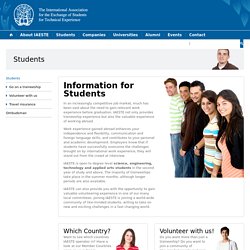
IAESTE not only provides traineeship experience but also the valuable experience of working abroad. Work experience gained abroad enhances your independence and flexibility, communication and foreign language skills, and contributes to your personal and academic development. Employers know that if students have successfully overcome the challenges brought on by international work experience, they will stand out from the crowd at interview. IAESTE is open to degree level science, engineering, technology and applied arts students in the second year of study and above.
The majority of traineeships take place in the summer months, although longer periods are also available. IAESTE can also provide you with the opportunity to gain valuable volunteering experience in one of our many local committees. Economist: Job description. Economists provide specialist advice based on the application of economic theory and knowledge.
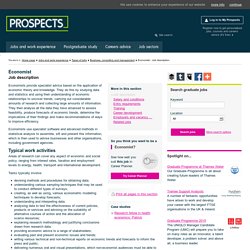
They do this by studying data and statistics and using their understanding of economic relationships to uncover trends, carrying out considerable amounts of research and collecting large amounts of information. They then analyse all the data they have amassed to assess feasibility, produce forecasts of economic trends, determine the implications of their findings and make recommendations of ways to improve efficiency. Economists use specialist software and advanced methods in statistical analysis to assemble, sift and present this information, which is then used to advise businesses and other organisations, including government agencies. Typical work activities Areas of research can cover any aspect of economic and social policy, ranging from interest rates, taxation and employment levels to energy, health, transport and international development.
Tasks typically involve: Society of Business Economists. After reviewing what the Society of Business Economists offers its membership, the Council has decided to launch a Professional Development programme.
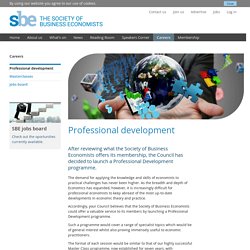
The demand for applying the knowledge and skills of economists to practical challenges has never been higher. As the breadth and depth of Economics has expanded, however, it is increasingly difficult for professional economists to keep abreast of the most up-to-date developments in economic theory and practice. Accordingly, your Council believes that the Society of Business Economists could offer a valuable service to its members by launching a Professional Development programme. Such a programme would cover a range of specialist topics which would be of general interest whilst also proving immensely useful to economic practitioners. Such a Professional Development programme, your Council believes, would benefit all members – and not just those at the early stages of their careers – by helping them to refresh and expand their knowledge. Working in Health Economics.
Author: Ian Murnaghan BSc (hons), MSc - Updated: 28 December 2012| Comment Health economics is one of those rapidly growing fields that links up business with health care.
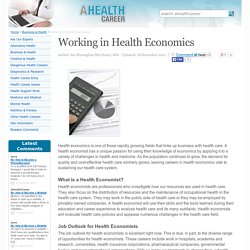
A health economist has a unique passion for using their knowledge of economics by applying it to a variety of challenges in health and medicine. As the population continues to grow, the demand for quality and cost-effective health care similarly grows, leaving careers in health economics vital to sustaining our health care system. What is a Health Economist? Health economists are professionals who investigate how our resources are used in health care. Job Outlook for Health Economists The job outlook for health economists is excellent right now. Envision Magazine Issue 1 by Envision Magazine.